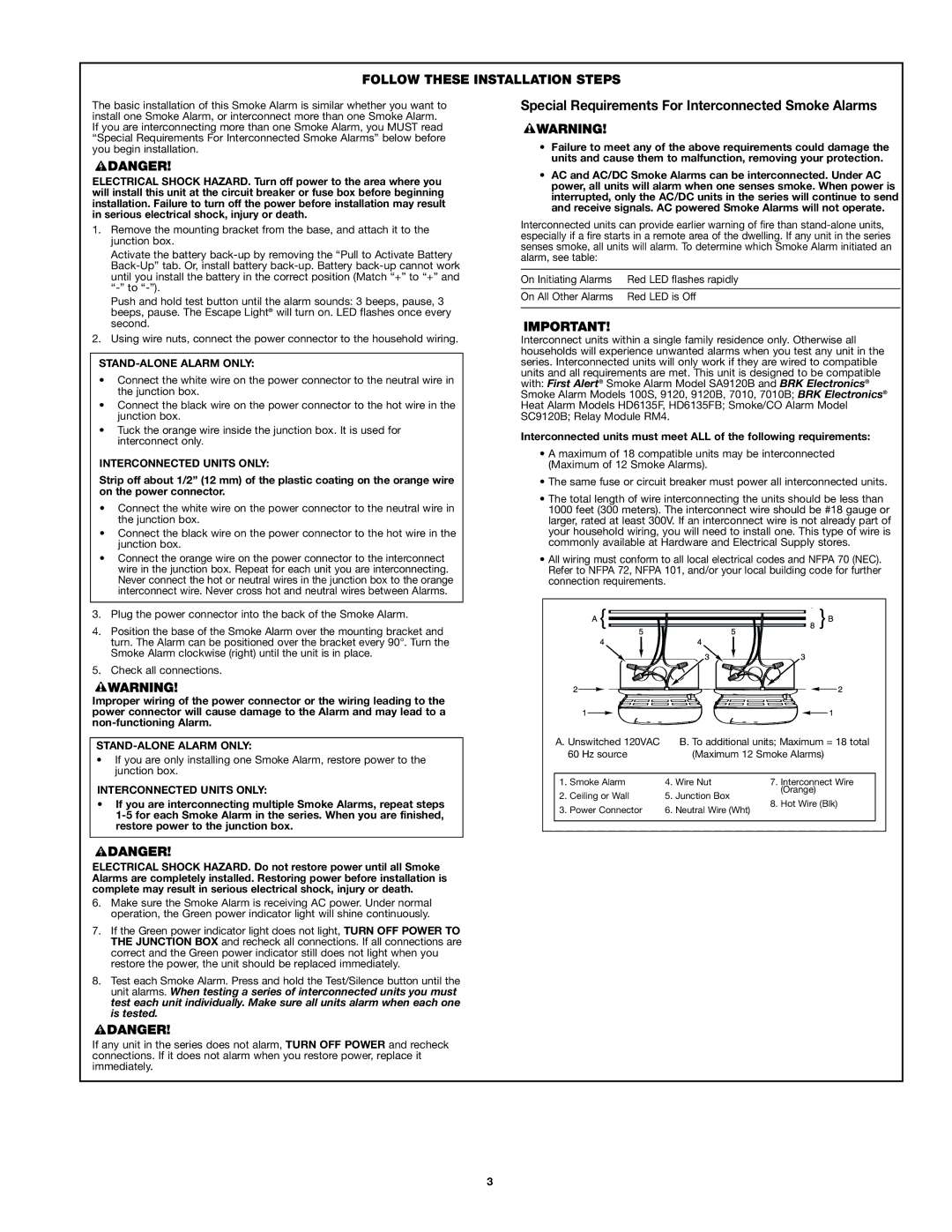
FOLLOW THESE INSTALLATION STEPS
The basic installation of this Smoke Alarm is similar whether you want to install one Smoke Alarm, or interconnect more than one Smoke Alarm. If you are interconnecting more than one Smoke Alarm, you MUST read “Special Requirements For Interconnected Smoke Alarms” below before you begin installation.
ELECTRICAL SHOCK HAZARD. Turn off power to the area where you will install this unit at the circuit breaker or fuse box before beginning installation. Failure to turn off the power before installation may result in serious electrical shock, injury or death.
1.Remove the mounting bracket from the base, and attach it to the junction box.
Activate the battery
Push and hold test button until the alarm sounds: 3 beeps, pause, 3 beeps, pause. The Escape Light® will turn on. LED flashes once every second.
2.Using wire nuts, connect the power connector to the household wiring.
STAND-ALONE ALARM ONLY:
•Connect the white wire on the power connector to the neutral wire in the junction box.
•Connect the black wire on the power connector to the hot wire in the junction box.
•Tuck the orange wire inside the junction box. It is used for interconnect only.
INTERCONNECTED UNITS ONLY:
Strip off about 1/2” (12 mm) of the plastic coating on the orange wire on the power connector.
•Connect the white wire on the power connector to the neutral wire in the junction box.
•Connect the black wire on the power connector to the hot wire in the junction box.
•Connect the orange wire on the power connector to the interconnect wire in the junction box. Repeat for each unit you are interconnecting. Never connect the hot or neutral wires in the junction box to the orange interconnect wire. Never cross hot and neutral wires between Alarms.
3.Plug the power connector into the back of the Smoke Alarm.
4.Position the base of the Smoke Alarm over the mounting bracket and turn. The Alarm can be positioned over the bracket every 90°. Turn the Smoke Alarm clockwise (right) until the unit is in place.
5.Check all connections.
Improper wiring of the power connector or the wiring leading to the power connector will cause damage to the Alarm and may lead to a
•If you are only installing one Smoke Alarm, restore power to the junction box.
INTERCONNECTED UNITS ONLY:
•If you are interconnecting multiple Smoke Alarms, repeat steps
ELECTRICAL SHOCK HAZARD. Do not restore power until all Smoke Alarms are completely installed. Restoring power before installation is complete may result in serious electrical shock, injury or death.
6.Make sure the Smoke Alarm is receiving AC power. Under normal operation, the Green power indicator light will shine continuously.
7.If the Green power indicator light does not light, TURN OFF POWER TO THE JUNCTION BOX and recheck all connections. If all connections are correct and the Green power indicator still does not light when you restore the power, the unit should be replaced immediately.
8.Test each Smoke Alarm. Press and hold the Test/Silence button until the unit alarms. When testing a series of interconnected units you must test each unit individually. Make sure all units alarm when each one is tested.
If any unit in the series does not alarm, TURN OFF POWER and recheck connections. If it does not alarm when you restore power, replace it immediately.
Special Requirements For Interconnected Smoke Alarms
•Failure to meet any of the above requirements could damage the units and cause them to malfunction, removing your protection.
•AC and AC/DC Smoke Alarms can be interconnected. Under AC power, all units will alarm when one senses smoke. When power is interrupted, only the AC/DC units in the series will continue to send and receive signals. AC powered Smoke Alarms will not operate.
Interconnected units can provide earlier warning of fire than
On Initiating Alarms | Red LED flashes rapidly | |||
On All Other Alarms | Red LED is Off | |||
|
|
|
|
|
|
|
|
|
|
|
|
|
|
|
|
|
|
|
|
|
|
|
|
|
Interconnect units within a single family residence only. Otherwise all households will experience unwanted alarms when you test any unit in the series. Interconnected units will only work if they are wired to compatible units and all requirements are met. This unit is designed to be compatible with: First Alert® Smoke Alarm Model SA9120B and BRK Electronics® Smoke Alarm Models 100S, 9120, 9120B, 7010, 7010B; BRK Electronics® Heat Alarm Models HD6135F, HD6135FB; Smoke/CO Alarm Model SC9120B; Relay Module RM4.
Interconnected units must meet ALL of the following requirements:
•A maximum of 18 compatible units may be interconnected (Maximum of 12 Smoke Alarms).
•The same fuse or circuit breaker must power all interconnected units.
•The total length of wire interconnecting the units should be less than 1000 feet (300 meters). The interconnect wire should be #18 gauge or larger, rated at least 300V. If an interconnect wire is not already part of your household wiring, you will need to install one. This type of wire is commonly available at Hardware and Electrical Supply stores.
•All wiring must conform to all local electrical codes and NFPA 70 (NEC). Refer to NFPA 72, NFPA 101, and/or your local building code for further connection requirements.
A } |
| 876 } B | |
5 | 5 |
| |
4 | 4 |
| |
| 3 | 3 | |
2 |
| 2 | |
1 |
| 1 | |
A. Unswitched 120VAC | B. To additional units; Maximum = 18 total | ||
60 Hz source | (Maximum 12 Smoke Alarms) | ||
1. Smoke Alarm | 4. Wire Nut | 7. Interconnect Wire | |
2. Ceiling or Wall | 5. Junction Box | (Orange) | |
8. Hot Wire (Blk) | |||
3. Power Connector | 6. Neutral Wire (Wht) | ||
| |||
3
